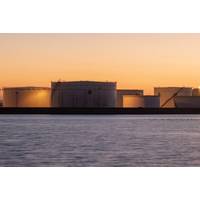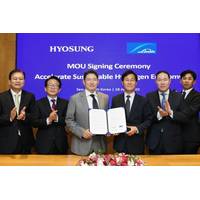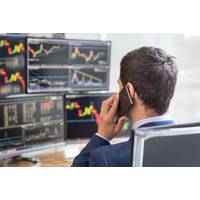China's petchem plants could be closed as US LPG tariffs loom
Industry insiders say that Chinese petrochemical manufacturers who buy US LPG worth $11 billion annually will cut production or close for maintenance as Beijing's tariffs on U.S. imported products drive up prices. Over 30 PDH plants rely heavily on U.S. LPG or propane for the production of propylene, a plastics intermediate. Armaan Ashraf is the global head of natural gases liquids for consultancy FGE. He said that tariffs may force Chinese PDH operators cut their average operating rates by 15 percent and reduce demand for propane at steam crackers and PDH by at least 500 000 metric tons each month.
Natgas producer BKV is valued at $1.56 billion in its NYSE debut
BKV shares rose by 3.1% on their New York Stock Exchange debut on Thursday. This gives the U.S. Natural Gas Producer a market cap of $1.56 Billion. Companies looking to list shares have a new window of opportunity as the long-awaited rate-cutting cycle of the U.S. Federal Reserve begins. Several companies are also speeding up their plans in order to avoid the uncertainty that will result from the November presidential elections. BKV shares opened at $18.55 on their debut, as opposed to the $18 price for the initial public offer. The company raised $270m by selling 15 million of its shares at $18 per share…
Iran's Oil Storage Almost Full as Sanctions and Pandemic Weigh

Iran has slashed crude oil production to its lowest level in four decades as storage tanks and vessels are almost completely full due to a fall in exports and refinery run cuts caused by the coronavirus pandemic, industry data showed.Total onshore crude stocks surged to 54 million barrels in April from 15 million barrels in January, and swelled further to 63 million barrels in June, according to FGE Energy.Market intelligence firm Kpler estimated Iranian average onshore crude storage for June to be around 66 million barrels.That is around 85% of available onshore storage capacity."However…
Linde, Hyosung to Build World’s Largest Liquid Hydrogen Plant in S. Korea

South Korea's Hyosung and the global industrial gases provider Linde Group will invest in the construction of a liquid hydrogen plant on an area of about 30,000 square meters within the site of Hyosung Yongyeon plant in Ulsan.Its annual capacity of production will be 13,000 tons of liquid hydrogen, which is enough to fuel 100,000 sedans. According to Hyosung, the plant will be the world’s single largest liquid hydrogen manufacturing facility. The two companies will form a joint venture this year, break ground in the first quarter of…
U.S. NatGas Prices Near 25-year Low as Glut Weighs

In the shale field that helped launch the U.S. natural gas boom a decade ago, Chesapeake Energy Corp this month set aside its last drilling rig. The problem for the once No. 2 U.S. gas producer was not a lack of gas, but too much of it.A long, steady increase in U.S. gas production – much of it a byproduct of the shale oil boom – has prices for the fuel heading toward a 25-year low, with output outpacing U.S. consumption and expected to hit 91.6 billion cubic feet, up 10% over last year, according to government and industry estimates.Producers have sought to turn much of the U.S. surplus to liquefied natural gas (LNG) and export it.
Maersk Develops Ship Fuel from Alcohol
Danish shipping conglomerate A.P. Moller - Maersk has joined forces with Wallenius Wilhelmsen, BMW Group, H&M Group, Levi Strauss and Marks & Spencer to explore LEO, a blend of lignin and ethanol, as a potential future sustainable shipping fuel.The LEO Coalition, which also includes Copenhagen University, will consider the environmental and commercial viability of LEO fuel for shipping. Shipping accounts for 2-3% of global CO2 emissions, a proportion that is set to increase as global trade continues to grow at a sluggish but steady pace.
India's Thermal Coal Imports Could Rise 10 pct in 2019

India's thermal coal imports could rise by about 10 percent in 2019 due to rail transport problems and other logistical bottlenecks, an executive at the country's largest coal trader Adani Enterprises said on Tuesday.Thermal coal imports rose in 2018 after two years of decline, despite moves by Prime Minister Narendra Modi’s government to cut the country's imports in a bid to reduce the trade deficit.Rajendra Singh, chief operating officer for coal trading at Adani Enterprises, said thermal coal imports this year could total 174 million…
Japan's U.S. LPG 2017 Imports hit Record High
U.S. now meets half of Japan's LPG demand; U.S. supplies have soared as part of shale boom. Japan's liquefied petroleum gas (LPG) imports from the United States are expected to double in 2017 to a record and account for around for around half of its total purchases, government and shipping data showed. The surge comes as shale oil and gas output lifts overall U.S. production to rival that of Saudi Arabia and Russia. As with crude oil, the American exports displace LPG from the Middle East, where regional top producer of crude and LPG Saudi Arabia is losing market share…
U.S. Gulf Refiners Recovering Slowly, Carefully
U.S. refineries are restarting after Hurricane Harvey forced them to shut down two weeks ago, raising the risk of fires and explosions that could prolong fuel supply disruption as plants simultaneously reheat units and reactivate catalysts. Restarts are one of the most dangerous times for refinery workers, so operators keep shutdowns to a minimum. Plants typically shut only a few units for overhaul in spring and fall, with most refinery units remaining in operation for 4-6 years between full maintenance shutdowns. Harvey sparked several unscheduled closures…
Iraq's Fuel Oil Exports Soar Despite OPEC Cut
Increased exports intended to help maintain oil revenues; March exports more than triple 2016 monthly average. Iraqi fuel oil exports have soared since January despite a reduction in the country's crude production in line with OPEC supply cuts, industry sources said, in what could be a way to boost output of refined products and maintain oil revenues. Iraq on average exported between 80,000 and 160,000 tonnes of fuel oil per month in 2016, data collected by Thomson Reuters Oil Research showed. But volumes sold to Asia have jumped this year, with Iraq's global exports of fuel oil reaching more than 500,000 tonnes in March alone, according to Reuters data.
EU Refiners Cash in Despite OPEC Cuts
Oil from Nigeria, Libya and Kazakhstan gives a boost; margins average 50 percent higher than Q1 2016 and Fuel oil cracks strengthen. A global deal to cut oil production has had the unintended consequence of aiding Europe's older refineries by bolstering supplies of light crude while curbing shipments of the heavier grades favoured by more advanced plants in other continents. These European units, long thought doomed by competition from state-of-the-art refineries in the Middle East, Asia and the United States, are in the right place at the right time - enjoying good demand and oil availability that is, for them, growing.
Death of Castro Could Free Cuba to Produce Biofuels
The death of Cuban revolutionary Fidel Castro, a fierce critic of biofuels like ethanol, has raised hopes among industry experts that some of Cuba's vast tracts of fallow land may soon be used to ease its dependence on fuel imports. His words set an ethical red line for Cuban energy production that has not been crossed, despite modernization undertaken by Castro's brother Raul, who took over the presidency provisionally upon Fidel's illness in 2006 and definitively in 2008. Cuba currently produces 96 percent of its energy with fossil fuels, around 60 percent of which are imported.
Biofuel Producers Blast EU for Slashing Crop-based Fuel Use
European biofuel producers said a proposal by Brussels to nearly halve the level of crop-based biofuel used in the European Union by 2030 was a U-turn in policy that would threaten jobs and boost animal feed and crude oil imports. The European Commission proposed in a draft law reforming the EU energy market to cap crop-based or so-called first generation biofuels' share of fuels used in transport to 3.8 percent in 2030 from 7 percent in 2021. "The biofuel sector feels betrayed by the Commission because of its complete disregard for the investments made in good faith on the basis of EU policy…
Canadian Carbon Price Worries Farmers, Fertilizer Makers
Canada's carbon price may weaken the farm sector in one of the world's biggest grain-shipping countries, raising farmers' costs and discouraging investment in fertilizer production, industry groups say. Ottawa this month promised a price on carbon emissions by 2018 to protect the environment, and will let provinces choose between a tax or cap and trade system. Carbon pollution will cost C$10 a tonne in 2018, rising annually until reaching C$50 in 2022. At C$50, it would raise fertilizer prices by C$2 per acre for Canadian farmers, and some experts peg the total farm cost at C$6 an acre, according to the CIBC bank.
PDVSA Awards $138 mln Contract to Tackle Petcoke Problem
Venezuelan state oil company PDVSA said on Friday that Maroil Trading Inc has won a $138 million contract to remove a large pile of petroleum coke at the Jose solids terminal in the eastern state of Anzoategui. Petcoke, a byproduct of upgrading tar-like Orinoco oil into lighter crude, has accumulated quickly at Jose since a 2009 fire temporarily halted its export. The large black dunes have drawn criticism from environmentalists and nearby communities. PDVSA rejects environmental criticism as a smear campaign by enemies of Venezuela's socialist government.
Total Looks Beyond Bolivia's Incahuasi to Regional Gas Market
Oil and gas giant Total could start the second phase of its Incahuasi gas project in Bolivia as early as 2017 if the right market conditions and incentives for investments are in place, the company's director for the Americas said on Friday. The $1.2 billion Incahuasi gas and condensate project which will officially be inaugurated on Friday, began production at three wells in August. Total aims to ramp output to more than 7 million cubic meters of gas per day by the end of September, about 10 percent of Bolivian production, from 5.2 million as soon as a compressor is added to increase pressure, Michel Hourcard told Reuters.
Twin Dredgers for Canadian Oil Sands

Damen Shipyards Group has completed a construction contract comprising two electric-powered Cutter Suction Dredgers (CSD) for the Canadian oil sands industry. With both vessels built in Canada, the contract marks the close cooperation between Damen and Aecon, Canada’s largest publicly traded infrastructure development and construction company. Two newly-built Damen CSDs have commenced operations in Northern Alberta, Canada. The two 40.64-meter-long vessels perform dredging duties in oil sands tailings ponds. These tailings are a byproduct…
European Oil Refiners Set to Slow Down as Profits Fall
European refiners will likely cut their operating rates in the coming weeks in the face of falling margins, ending a rarely seen strong run of profits, consultancy Wood Mackenzie said on Wednesday. Benchmark northwest European refining margins <BRT-ROT-REF> dropped this week to their lowest level since July 2014 after diesel prices slumped due to a growing glut in the region as a result of a wave of imports. Weaker refining margins and operating rates bode badly for Europe's top oil companies including Royal Dutch Shell, BP and Total…
US Oil Producers Mull Wastewater Spin-offs
Some U.S. oil producers are trying to sell parts of their lucrative saltwater disposal businesses in a sign that cheap crude is already forcing cash-starved companies to sell assets so oil can keep flowing. Many oil companies rely on outside contractors, which tend to be small, privately-held companies, to inject the briny byproduct of crude production hundreds or thousands feet deep into the earth, well below the water table. But for producers which own such facilities, the high-margin business has served as a source of cost savings and steady revenue…
Oklahoma Imposes Water Injection Cut Rules
Oklahoma regulators are imposing new restrictions on energy companies injecting wastewater underground, in the latest effort to stem a sharp increase in earthquakes. The new rules, announced by the Oklahoma Corporation Commission on Monday evening, require operators in parts of two Oklahoma counties to reduce the amount of saltwater they inject underground by 38 percent from current levels in the next 60 days. The reduction will bring injected volumes to about 2.4 million barrels below those in 2012, when the most dramatic spike in the area earthquakes began. The restrictions affect 23 wells run by 12 operators.
